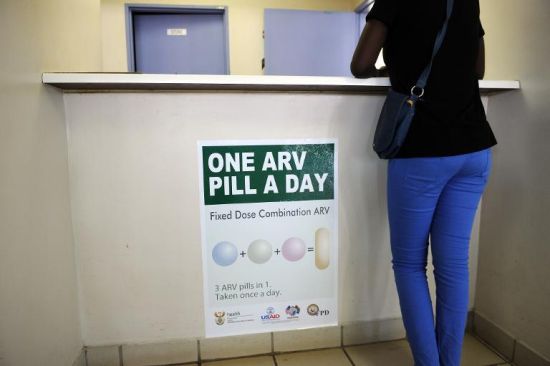双语:十年来青少年感染艾滋人数上升33%
 A woman queues at a clinic on April 8, 2013 during the launch of the new single dose anti-AIDs drug, in Ga-Rankuwa, South Africa(Agencies)
A woman queues at a clinic on April 8, 2013 during the launch of the new single dose anti-AIDs drug, in Ga-Rankuwa, South Africa(Agencies)The number of adolescents infected by the HIV virus has jumped by one third over the past decade, the UN's health agency said Monday, blaming gaps in care programmes.
"More than 2 million adolescents between the ages of 10 and 19 years are living with HIV," marking a 33 percent rise since 2001, the World Health Organization said.
"Many do not receive the care and support that they need to stay in good health and prevent transmission. In addition, millions more adolescents are at risk of infection," it warned.
In the world's most AIDS-affected region, sub-Saharan Africa, the majority of adolescents with the virus are girls who have had unprotected sex, sometimes under duress.
In addition, many of those born with the virus or infected at birth in sub-Saharan Africa are becoming adolescents.
In Asia, meanwhile, young drug-users were the worst affected.
The WHO said that the failure to provide proper adolescent-focussed programmes had also resulted in a 50-percent increase in reported AIDS-related deaths in the age group from 2005 to 2012.
In 2005, 70,000 adolescents died of AIDS. Seven years later, the figure was 104,000.
That contrasted starkly with the 30-percent decline in the general population, the WHO underlined.
The year 2005 marked the high point of global AIDS deaths, which hit 2.3 million. Last year, the toll was 1.6 million.
"Adolescent girls, young men who have sex with men, those who inject drugs or are subject to sexual coercion and abuse are at highest risk," said Craig McClure, head of HIV programmes at UN children's agency UNICEF.
"They face many barriers, including harsh laws, inequalities, stigma and discrimination which prevent them from accessing services that could test, prevent, and treat HIV," McClure added.
"About one-seventh of all new HIV infections occur during adolescence. Unless the barriers are removed, the dream of an AIDS-free generation will never be realised," he insisted.
The data was issued as the WHO released its first adolescent-specific care guidelines ahead of World AIDS Day on December 1.
"Adolescents face difficult and often confusing emotional and social pressures as they grow from children into adults," said Gottfried Hirnschall, head of the WHO's HIV/AIDS Department.
"Adolescents need health services and support, tailored to their needs. They are less likely than adults to be tested for HIV and often need more support than adults to help them maintain care and to stick to treatment," he added.
Among the measures needed, the WHO said, is an end to the requirement for parental permission to have an HIV test.
In sub-Saharan Africa, it is estimated that in the 15-24 age bracket, only 10 percent of young men and 15 percent of young women know their HIV status.
In other regions, although data are scarce, access to HIV testing and counselling by vulnerable adolescents is consistently reported as being very low, the WHO said.
据法国媒体报道,世界卫生组织11月25日宣布,过去十年间感染艾滋病病毒的青少年人数增加了33%,2012年全世界10到19岁的青少艾滋病病毒感染人数约为210万。
该组织警告说:“很多人并没有受到保持健康和阻止传播所需要的关怀和支持。此外,另有数百万名青少年面临感染艾滋病的风险。”由于相关服务项目的缺乏,在2005年到2012年间,青少年中艾滋病死亡人数增长了近50%,从2005年的7万升到2012年的10.4万。与此形成鲜明对比的是,同期全球艾滋病死亡人数下降了30%,从2005年的230万降至2012年的160万。
更糟糕的是,很多人并不清楚自己是否患上了艾滋病。撒哈拉以南非洲15到24岁年龄段人群中,只有10%的男性和15%的女性知道自己的感染状况。
联合国儿童基金会艾滋病项目负责人克雷格•麦克卢尔说:“青春期女孩,与同性发生性行为的年轻男子,注射毒品者,以及遭受性压迫和性虐待的人是高风险人群。他们面临严苛的法律、不平等、污名、歧视等障碍,这些障碍让他们无法获得检测、预防和治疗艾滋病的服务。”因此他认为,必须清除这些障碍。
世界卫生组织在1988年将每年的12月1日定为世界艾滋病日,号召世界各国和国际组织在这一天举办活动,宣传和普及预防艾滋病知识。目前,该组织已经发布了一份针对青少年艾滋病病毒感染者及有感染风险者防控特殊需求的指导意见,意图加强为该群体提供的服务和支持。
(信莲 编辑:玉洁)
- 第一个感恩节没吃火鸡 吃玉米大餐(双语)2013-11-29 09:54
- 双语:15句《唐顿庄园》中英伦范儿俚语2013-11-27 18:25
- 哈利波特现身火车站 路人爆笑反应(双语)2013-11-27 18:11
- 中博士荷兰选秀 被指像中餐服务员(双语)2013-11-27 17:56
- 双语:大学四年学不到的七项人生技能2013-11-27 17:42
- 双语:旅行让你生活更幸福的七大理由2013-11-27 14:49
